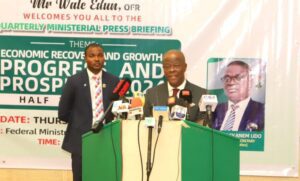
2023 General Elections: Cyber attacks on INEC technology hit 16.8m
As the Independent National Electoral Commission (INEC) concluded its review of the results of the gubernatorial election conducted last Saturday, March 18, the Federal Government (FG) has disclosed that no less than 3,834,244 cyber attacks were targeted at the technology architecture deployed for the management of the election.
The said figure of 3,834,244 was aside the 12,988,978 figure recorded during the February 25 Presidential and National Assembly elections (NASS), bringing the total figure to over 16.8 million (16,823,222) attacks.
Following the introduction of technology in the management of election, particularly with the use of the Bimodal Voter Accreditation System (BVAS) and the INEC Result Viewing (IReV) Portal, political actors seeking to manoeuvre the electoral process have also shifted focus to lauch attacks against the system.
On Wednesday, Minister of Communications and Digital Economy, Prof. Isa Ali Pantami disclosed that a total of 3,834,244 attacks were recorded during the just concluded governorship and State Houses of Assembly (HoA) elections, originating from both within and outside Nigeria.
Recall NewsDirect had reported that during the presidential and the NASS elections, no less than 12.9 million cyberattacks targeted at the system were recorded from within and outside the Country.
The attacks had posed some constraints on the INEC particularly in uploading results electronically, a development that erupted reactions from stakeholders who argued it was a breach of promise on the part of INEC.
The Minister of Communications and Digital Economy, Prof Isa Pantami, had in a statement by his media aide, Uwa Suleiman, disclosed that over 6.9 million attacks were recorded on election day alone.
According to Pantami, the attacks were successfully blocked due to the sophisticated infrastructure on the ground by different agencies of government charged with the responsibility of protecting the nation’s cyberspace.
“A total of 12,988,978 attacks were recorded, originating from both within and outside Nigeria. It is worth noting that the Centrr =ØOÞs successfully blocked these attacks and/or escalated them to the relevant institutions for appropriate action.
“During this period, a series of hacking attempts were recorded, including Distributed Denial of Service (DDoS), email and IPS attacks, SSH Login Attempts, Brute force Injection attempts, Path Traversal, Detection Evasion, and Forceful Browsing.
“The parastatals, under the supervision of the Ministry of Communications and Digital Economy, have played a crucial role in providing the enabling environment for the successful conduct of a credible, free, fair, and transparent election,” he had said.
Meanwhile, on the Saturday March 18, gubernatorial and HoA polls, the Minister in a statement on Wednesday by his Senior Technical Assistant (Research and Development), Dr Femi Adeluyi, noted that the activities of cyber threat actors on the Nigerian cyberspace during the gubernatorial and HoA elections were much lower than those of the Feb. 25 Presidential and NASS elections.
According to him, a daily breakdown of the attacks from the attacks shows that: on Friday 17th March, 2023, 1,046,896 attacks were recorded, on Saturday 18th March, 2023: 1,481,847; Sunday 19th March, 2023: 327,718 and on Monday 20th March, 2023: 977,783.
The Minister pointed out that, “the attacks were not surprising nor unexpected as, Nigeria being Africa’s largest democracy, the Presidential and National Assembly elections are bound to attract much attention of everyone, including cyberthreat actors, than during the Gubernatorial and State Assembly elections.”
He expressed confidence that “the implementation of some recommendations as well as measures taken to fortify our cyber defence mechanisms might have helped in this regard.”
The Minister reiterated that these attainments would not have been possible without the continued support of the administration towards ensuring Nigeria’s successful transition into the digital economy.
“The digital economy sector has enjoyed Mr President’s unprecedented support and it is highly appreciated,” he said.
Nigerian NewsDirect had before the March 18 polls, reported that INEC and other relevant Federal Government Agencies were under pressure to resist the preponderance of cyber attacks targeted to mar the electronic management of the election.
Stakeholders have commended the use of technology, pointing out it helped curbed pervasive electoral malpractices. Although some have knocked INEC on glitches experienced during the Feb. 25 presidential and NASS elections, yet observers have commended improvements recorded during the second phase of the General Elections of the March 18 gubernatorial and HoA polls.
Meanwhile, INEC, on Wednesday said it had concluded a review of the results of last Saturday’s governorship election, which held in 28 States.
The Commission, also said it had completed the review of the results for the Abia and the Enugu States, where it had earlier suspended further collation following a series of electoral malfeasance and violence.
In a statement on Wednesday, the National Commissioner in charge of the Information and Voter Education Committee, Festus Okoye, INEC recalled that it had met on Monday, March 20 and reviewed the conduct of the governorship and HoA elections held nationwide on Saturday, March 18.
“Arising from the meeting, the Commission took the decision to suspend further collation of the governorship election results in some parts of Abia and Enugu states, to carry out a review of the collation processes in both states.
“The Commission has concluded the review. Consequently, the collation of results for the governorship election in both Abia and Enugu states will continue today (Wednesday), March 22.
“The Commission appreciates the patience and understanding of the people of both states as we conclude the collation processes,” the statement read partly.



